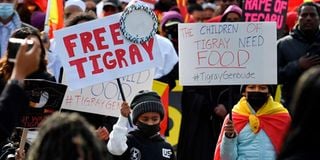The Ethiopia political quandary and Africa’s development curse

Demonstrators march in Washington, DC on November 4, 2021, marking the one-year anniversary of the Ethiopian government's decision to deploy troops into the country's northernmost Tigray region.
Once in a while, a country in Africa defies the odds to post a stunning performance. Such countries have performed surprisingly well—and long enough—to silence sceptics. These African miracles have served to renew hope for a hopeless continent.
But while admirable, that is often short-lived. Soon, avowed enemies of the continent engineer a crisis by recruiting and arming greedy clueless Africans and deploy them to launch a brutal civil war. There are usually three end-goals: Remove pro-poor and pro-development leadership, install a puppet government, and reverse and destroy all gains. This is the African tragedy and development curse. It seems some countries would never accept a happy, peaceful and prosperous Africa.
It’s been 10 years since Nato launched military strikes on Tripoli in an assault and intervention that overthrew President Muammar Gaddafi and led to his assassination and eviscerated Libya’s economic, social and institutional fabric. In a moment, Libya went from Africa’s most advanced nation to a bombed-out, lawless territory where captured black migrants are sold by Arabs on open slave markets.
In the Horn of Africa, Ethiopia entered the 21st Century as a war-scarred nation where adverse weather, difficult terrain and a brutal communist regime had pushed millions of its people into starvation and death.
With a closed economy that was minuscule, rudimentary and barely growing, its rapidly growing population faced a bleak future. There were 66 million people in a $17 billion economy. In contrast, Kenya had just 31.9 million people but an economy worth $32 billion.
Gender equality
By localising the Millennium Development Goals (MDGs), it made significant social and economic progress. It met all but two MDGs: Gender equality and empowerment, and improving maternal health. It nearly hit double-digit growth for 15 years in a row—an admirable feat.
This strong, sustained broad-based growth has transformed lives in tangible ways. The government says the population living below the poverty line has fallen from 44.2 per cent in 2000 to 19.1 per cent last year.
This impressive accomplishment has been corroborated by the World Bank, which shows comparable decline in extreme poverty from 30 per cent (2011) to 24 per cent (2016). Also, more than 52 million people now live within 1.5 kilometres of an improved drinking water source, up from just six million 30 years ago. In 2015, its economy finally overtook Kenya’s as the largest in Eastern and Central Africa.
Trigger resistance
Ever since Ethiopia opted to pursue its economic aspirations, as an independent and sovereign nation, there have been concerns that this was to trigger resistance—even military intervention. Take the case of the $5 billion Grand Ethiopian Renaissance dam on the Blue Nile, an infrastructural masterpiece and potential major source of clean and renewable energy for Africa. The dam is also to promote food security through large irrigation schemes.
From the start, it has been dogged with controversy. Western powers have aligned with Egypt to firmly oppose the damming of the Nile. At the heart of the dispute is a colonial treaty that gives the primary claims to the Nile waters, including in its catchment areas, to Egypt. Ethiopia, which was never colonised, stands in defiance.
Egypt, Sudan along with their Arab allies have and continue to threaten Ethiopia. Even then US President Donald Trump weighed in, calling for a surprise attack on Addis Ababa. Although these threats have not materialised, the Ethiopian government has, in recent months, been embroiled in a simmering war with the Tigray People’s Liberation Front (TPLF).
There is a possibility that this war could be leveraged by outside forces to trigger a situation similar to what happened in Libya. Western governments are already accusing Prime Minister Abiy Ahmed, the 2019 Nobel Peace Prize laureate, and his government of committing gross human rights violations and blocking humanitarian assistance from reaching internally displaced persons. Might the UN Security Council invoke the Responsibility to Protect (R2P) resolution, which halted Libya’s march to greatness, against Ethiopia too?
Whereas there appears to be a coordinated and sustained campaign to ostracise the government, criticism of the TPLF is largely muted. Some even praise TPLF as an upstanding pro-democracy force. Besides levelling harsh criticism, the Joe Biden administration has threatened to suspend Ethiopia from the United States’ tariff-free African Growth and Opportunity Act. Will the West finally colonise Ethiopia through TPLF?





